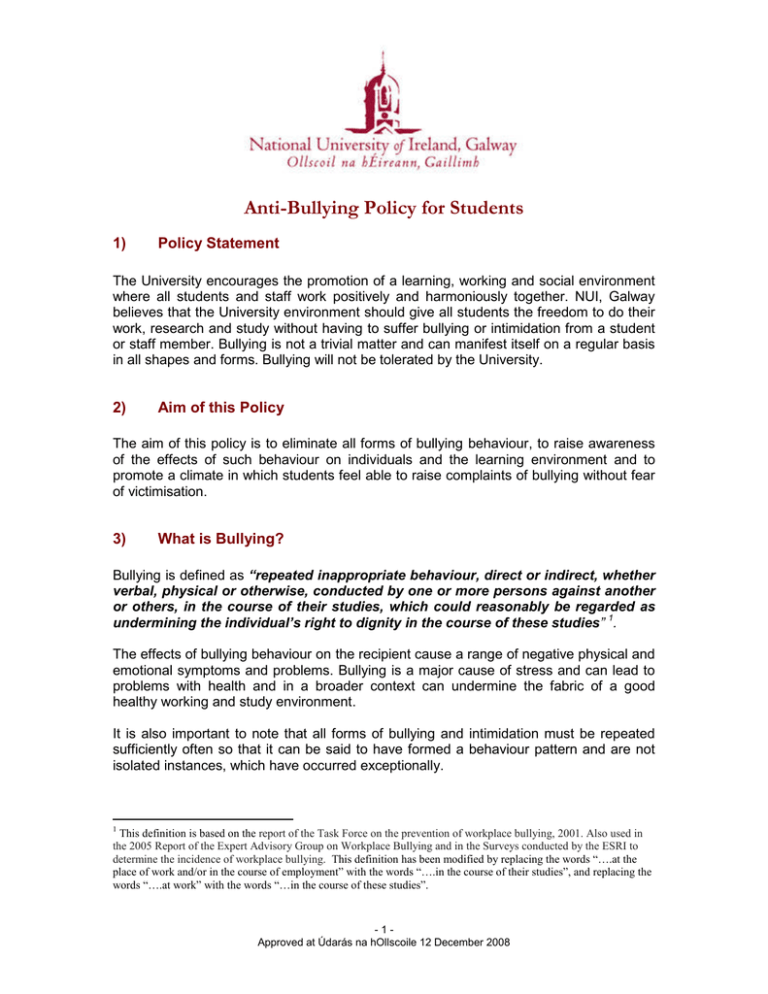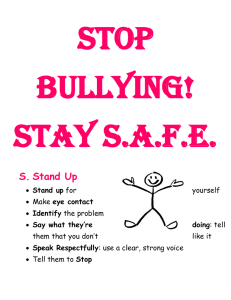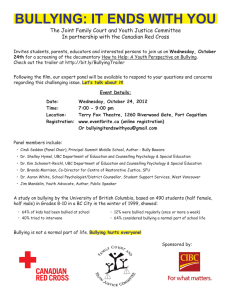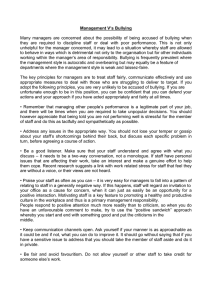Anti-Bullying Policy for Students 1) Policy Statement
advertisement

Anti-Bullying Policy for Students 1) Policy Statement The University encourages the promotion of a learning, working and social environment where all students and staff work positively and harmoniously together. NUI, Galway believes that the University environment should give all students the freedom to do their work, research and study without having to suffer bullying or intimidation from a student or staff member. Bullying is not a trivial matter and can manifest itself on a regular basis in all shapes and forms. Bullying will not be tolerated by the University. 2) Aim of this Policy The aim of this policy is to eliminate all forms of bullying behaviour, to raise awareness of the effects of such behaviour on individuals and the learning environment and to promote a climate in which students feel able to raise complaints of bullying without fear of victimisation. 3) What is Bullying? Bullying is defined as “repeated inappropriate behaviour, direct or indirect, whether verbal, physical or otherwise, conducted by one or more persons against another or others, in the course of their studies, which could reasonably be regarded as undermining the individual’s right to dignity in the course of these studies” 1. The effects of bullying behaviour on the recipient cause a range of negative physical and emotional symptoms and problems. Bullying is a major cause of stress and can lead to problems with health and in a broader context can undermine the fabric of a good healthy working and study environment. It is also important to note that all forms of bullying and intimidation must be repeated sufficiently often so that it can be said to have formed a behaviour pattern and are not isolated instances, which have occurred exceptionally. 1 This definition is based on the report of the Task Force on the prevention of workplace bullying, 2001. Also used in the 2005 Report of the Expert Advisory Group on Workplace Bullying and in the Surveys conducted by the ESRI to determine the incidence of workplace bullying. This definition has been modified by replacing the words “….at the place of work and/or in the course of employment” with the words “….in the course of their studies”, and replacing the words “….at work” with the words “…in the course of these studies”. -1Approved at Údarás na hOllscoile 12 December 2008 3.1 Examples of Bullying (not an exhaustive list) • Aggressive behaviour by one individual towards another. • Repeated verbal harassment • Personal insults and name-calling • Persistent criticism • Persistent picking on a person for the butt of jokes, horseplay, uncomplimentary remarks or other behaviour likely to cause offence • The maligning or ridiculing of a person directly or to others • Unfair delegation of duties and responsibilities • Refusal to communicate in normal collegiate way • Aggressive behaviour, physical intimidation, unwelcome physical contact up to and including assault. • Cyber bullying where humiliation is caused through the use of chat rooms or email Further examples are available on the Health & Safety Authority’s Website. www.hsa.ie Single acts of the above or other acts of unpleasantness or aggression, although unwelcome, do not constitute bullying, but may be the subject of another internal policy or procedure, e.g., ‘Harassment and Sexual Harassment Policy’, or ‘Discrimination Complaints Procedure, Students or Course Applicants’. The most serious effects of bullying can be fear, anxiety and depression. To these may be added severe loss of confidence and low self-esteem. Bullying, like stress generally, has a detrimental effect on the organisation as a whole because people operating in a climate of fear and resentment do not give of their best. The effects on the learning organisation as a whole can include: • Increased absenteeism • Low motivation • Reduced productivity • Hasty decision-making -2Approved at Údarás na hOllscoile 12 December 2008 • Reduced efficiency Complaints Procedure 1. Scope This procedure applies only to areas of University operations and programmes. It applies to the conduct of all University students and staff members, All students should be aware that bullying, which affects the dignity of people, is unacceptable and can be grounds for disciplinary action. This procedure applies where a student is alleged to have bullied another student, where a student is alleged to have bullied a staff member or where a staff member is alleged to have bullied a student. 2. What to do if you consider yourself to be the victim of Bullying Students who feel they are being bullied have two options available to them. They can choose either the Formal or Informal option. The procedure to be followed is outlined clearly below. Students who wish to make a complaint (Complainant) of bullying under the Anti Bullying procedure for Students should be aware that once a member of NUI Galway staff (other than a designated contact person) has been notified of a complaint either orally or in writing it is then considered to be in the Formal procedure. The University will immediately instigate the formal process to ensure that the rights of both the complainant and the alleged perpetrator(s) are safeguarded. 2.1 Where can I get advice? Advice on the invocation of the procedure may be obtained from any source of the student’s liking. The following are some examples of where such advice is available: Head of School or Dean of College Students’ Union Equality Manager - Human Resources Office Contact Person1 Advice on the details of their own particular issue, in advance of notifying the University, may be obtained from the following sources: Contact Person1 Students’ Union A source of their choice not within NUI Galway. -3Approved at Údarás na hOllscoile 12 December 2008 Anyone can become the victim of a bully at some point in their life. Those who bully can, at other times also be victims themselves, redirecting their anger to someone more vulnerable than themselves. Bullying can cause severe consequences both short and long term. It is important that those involved seek appropriate support. Free and confidential help is provided by the Counselling Service. This is separate from any other additional action which the person(s) concerned may choose to take through the formal/informal procedure outlined below. 3. Informal Procedure The University supports the resolution of complaints, as far as is possible and appropriate, through informal processes. In many cases the problem of bullying can be resolved informally. Students who believe they are being bullied and wish to attempt to resolve it informally should explain the following clearly to the alleged perpetrator(s): Details of the behaviour in question. The fact that it is unwelcome and offensive to them. The harmful effects it is having on them. That it is contrary to university policy. To facilitate this, the complainant should keep a record of events as they occur; what happened, dates, times, places, witnesses (if any), the complainant’s response and the impact of this behaviour. It may be the case that the alleged perpetrator(s) does not realise that they are perceived to be behaving in a manner, which is affecting another. Where students find it difficult to communicate directly with the perpetrator(s), they should be accompanied by a third party, for example a friend, Students’ Union representative, or a contact person1. This person’s role will be to provide moral support to the complainant while they are making their issues known to the alleged perpetrator(s). It is not their role to make the complaint on behalf of the complainant; however where it is evident that the complainant is having difficulty in presenting their issues the person accompanying them will be free to assist in the presentation. The alleged perpetrator(s) should be made aware at the time the meeting is being arranged that the complainant will be accompanied at this meeting. The alleged perpetrator(s) has the right to also be accompanied by a third party, for example a friend, colleague, trade union representative, Students’ Union representative, or contact person1 (for students only). The complainant should be made aware of this again at the time the meeting is being arranged. -4Approved at Údarás na hOllscoile 12 December 2008 If at this point the alleged perpetrator(s) agrees a solution with the complainant the remedial actions should be clearly identified and agreed by both parties. This will allow both parties to monitor the situation going forward. Both parties could agree notes in order to remove ambiguity later. The objective of the informal procedure is to allow both parties agree a framework where they will be able to continue to interact together in an appropriate manner. If this fails to resolve the issue or if either party wishes to have the matter dealt with formally they are entitled to refer the issue for processing through the formal procedure. 4. Formal Procedure If, following the informal route, there is no resolution OR at any point during the informal procedure OR the matter is too serious to be resolved in an informal way, a formal written complaint should be made as follows: • If a student is the alleged perpetrator, the complaint should be addressed to the Secretary for Academic Affairs2 who will forward the complaint to the University Disciplinary Committee for investigation under the existing Student Disciplinary Procedure; • If a staff member is the alleged perpetrator, the complaint should be addressed to the Director of Human Resources2 who will deal with the complaint under the Staff Disciplinary Procedure. 5. Victimisation Where an individual makes a complaint in good faith, gives evidence in proceedings or gives notice of intention to do so, they will not be victimised or subject to sanction. Victimisation as a result of reporting bullying will be regarded as a serious breach of discipline and automatically result in a formal investigation which may result in disciplinary action being taken against the perpetrator. It must also be noted that malicious complaints will also result in disciplinary action being taken. 6. Appeals Appeals shall be dealt with under the appropriate procedures. -5Approved at Údarás na hOllscoile 12 December 2008 1 The choice of contact person should be guided by two main criteria – accessibility and confidentiality. Contact persons must be accessible both in terms of their personal approach to relations with students and staff and in terms of their location and availability. It is also essential that they be capable of maintaining the highest level of confidentiality in respect of their dealings with complainants. The Training and Development Office will arrange appropriate training on the inter-personal, social and legal dimensions of the issues involved. A list of the contact persons is available on the Equality website http://www.nuigalway.ie/administration_services/equality/documents/current_list_of_contact_persons.pdf.. 2 In the event that the named individual has a conflict of interest in a case the matter will be dealt with by an alternative member of staff at the next level up, who does not have such a conflict. Where this is not possible, the matter will be dealt with by a member of staff at the same level as a minimum, who does not have such a conflict -6Approved at Údarás na hOllscoile 12 December 2008




